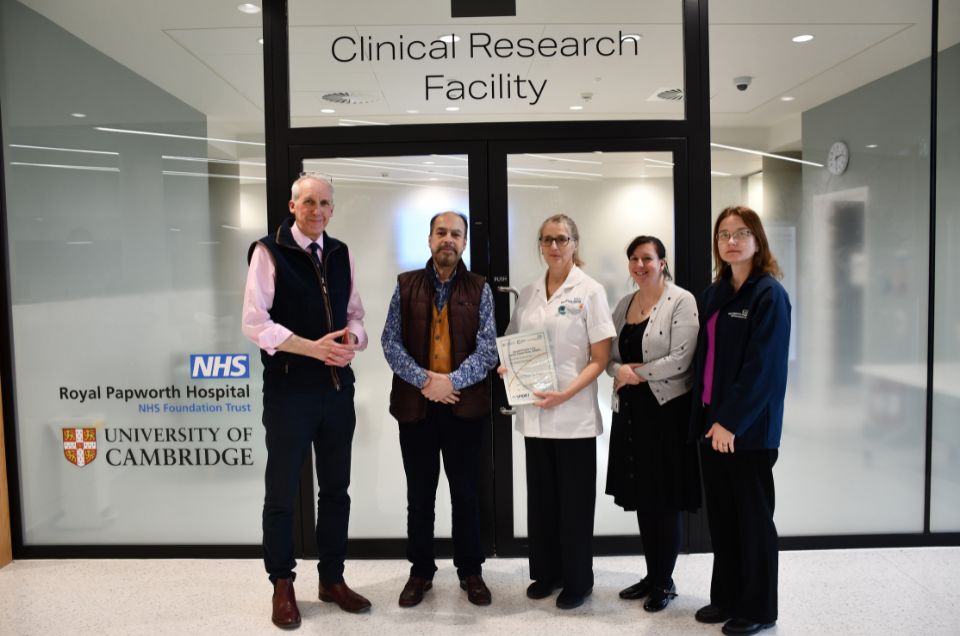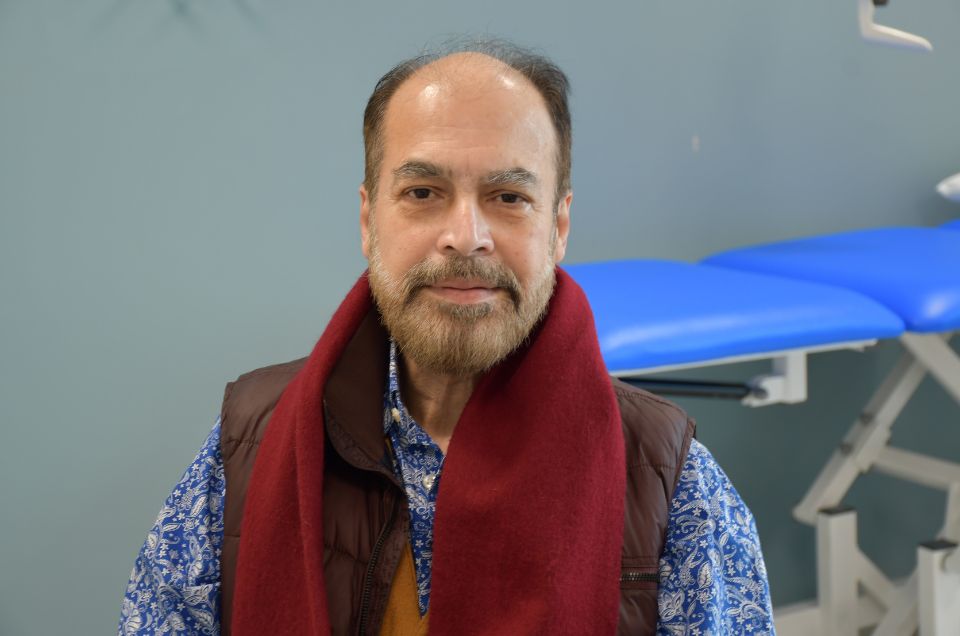The first patients in the UK have completed their participation in a study that hopes to detect cancer earlier.
Over the past five years, Sirajul Choudhury from Royston, Hertfordshire has participated in the SPORT (Secondary Primary Lung Cancer Cohort) study, led by Royal Papworth Hospital NHS Foundation Trust, having previously battled lung cancer himself.
The 62-year old, who moved to the UK from Bangladesh in 1994, was a heavy smoker and diagnosed with lung cancer in 2017. He subsequently received treatment at Royal Papworth, the UK’s leading heart and lung hospital.
During his recovery he was approached and signed up to the SPORT research study. Funded by Cancer Research UK, researchers hope to develop new blood tests that will tell clinicians in advance who is at the highest risk of developing another cancer following treatment for a primary lung cancer.

Sirajul Choudhury (second left) with Professor Robert Rintoul (far left) and and members of Royal Papworth Hospital’s research and development team.
Of his initial battle with lung cancer, Mr Choudhury said:
“When the doctor told me it was lung cancer, I was very worried because I had a very young child at the time. My father was a smoker and died of lung cancer and so did my uncle.
“Fortunately I found the best team at Royal Papworth Hospital. I was truly and heavenly treated here.”

Sirajul Choudhury was the first patient to complete participation in the SPORT study
Speaking about his participation in the SPORT study, he continued:
“I came from a family of doctors and medical professors in Bangladesh and unfortunately my father and uncle died of cancer. I joined the study for myself, for my family and for future generations.
“I was very happy to be involved and the research team are friendly and have made me feel comfortable.
“I wanted to contribute to research and do anything I could to help in the development of cancer treatments for future generations”.
Mr Choudhury was among 850 adult patients recruited to the study from 13 NHS hospitals in England and Scotland between January 2020 and September 2024, with Royal Papworth patients comprising a third (278) of those recruited.
Cancerous tumours often release pieces of DNA into the bloodstream, known as circulating tumour DNA (ctDNA).
Participants donate a blood sample every six months for up to five years.
Alongside patient data, these samples will be used to look for ctDNA and proteins in the blood, along with other signs that might suggest early stages of cancer.
Professor Robert Rintoul is Consultant Respiratory Physician at Royal Papworth Hospital, Chief Investigator of the SPORT study and co-leads the Cancer Research UK Cambridge Centre Thoracic Cancer Programme:
“Historically, survival from lung cancer was very poor with only 5% of patients surviving long-term. During the past 30 years, survival has improved to around 20% mainly because of better detection of early-stage lung cancer and more operations being performed.
“However, research has since shown that lung cancer survivors have 2-3 times greater risk than the general population of developing another primary cancer in the lungs during the 10 years after their first cancer was diagnosed.
“If we want to make further improvements in survival rates, we need to continue finding new ways to help diagnose patients even earlier, when more can be done to treat them effectively.
“We thank Mr Choudhury for his five-year participation in our SPORT study and indeed all our participants across England and Scotland who continue to contribute.
“This will be where the real strength of the study lies, giving us the samples and information that we need to develop new early detection tests of the future”.
Dr Marianne Baker, Research Information Manager at Cancer Research UK, said:
"Liquid biopsy tests look for cancer clues in samples of fluids like blood, and they’re changing the way we detect cancers that come back after treatment.
"The SPORT study is an exciting step towards a blood test that can help us spot signs of lung cancer returning, long before people experience symptoms. This could help doctors treat patients earlier, when treatment is more likely to be successful.
"We’re grateful to Mr Choudhury and everyone who signed up to take part in the SPORT study. Research like this can lead us to a world where everybody lives longer, better lives, free from the fear of cancer."
The results of the SPORT study will not be known for a number of years.
Everyone has the power to make a difference in research. Make your preferences about being part of health research known via the NHS app.
